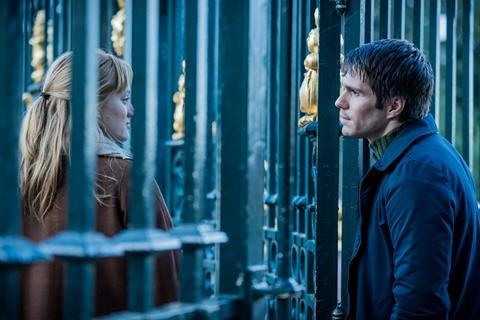François Civil and Nadia Tereszkiewicz also star in this tale of a concert pianist distracted by matters of the heart

Dir. Arnaud Desplechin. France. 2025. 115mins
The title might be Two Pianos, but the emotional register is on the full orchestral level in the latest from French writer-director Arnaud Desplechin, about a French concert pianist re-encountering his first love. A year after his cinephile docudrama-memoir Filmlovers!, he returns with a characteristically rhapsodic piece about love, death, music and memory, with just the occasional glimmer of the uncanny. Where he has often waxed autobiographical, here he ventures into seemingly less personal territory but with unmistakeable flourishes of his signature bravura style, putting music as ever to the expressive fore.
As with musical scores, it’s all in the performance
One expects both cerebral whimsy and hothouse emotiveness from Desplechin but, while the formula has often worked well internationally, this drama is likely to have less widespread appeal, starring as it does two actors who represent French cinema’s new generation but mean less abroad. The profiles of François Civil and Nadia Tereszkiewicz, together with Desplechin’s own, should earn Two Pianos solid bravos when it opens in France on October 15, following bows in Toronto and San Sebastian. Elsewhere it will be down to a typically commanding Charlotte Rampling to increase the international appeal of a film that will be seen as niche in a very Gallic, rather rarefied way.
Set in Lyon, the film begins with an intimate moment between a young married couple, Pierre (Jeremy Lewin) and Claude (Tereszkiewicz), with him telling her a wry Jewish anecdote – to which she promptly replies, “You wanted to abandon me?” That’s the kind of hot-wired emotional frequency at which people vibrate in this film, including pianist Mathias Vogler (Civil).
He’s first seen jetting back to Lyon from Japan, where he has been enjoying a solo concert career; he’s returning at the behest of his mentor, piano doyenne Elena (Rampling), who is soon to retire. Mathias is a brilliant musician, but neurotic, self-destructive and with a drinking problem – and one evening, spontaneously faints on seeing Claude. He also develops what seems a morbid obsession with a young boy he spots, apparently an uncanny dead ringer of Mathias as a child – although the explanation for the film’s streak of the fantastic proves to be all too mundane.
To Elena’s scathing disapproval, Mathias embarks on a wilful course of screwing up his career and his personal life. In this sense, the film resembles a reverse image of Jacques Audiard’s The Beat That My Heart Skipped: there a hoodlum dreamed of becoming a concert pianist, here a virtuoso seems set on retraining as an also-ran. Two Pianos eventually settles into being a dysfunctional love story, with Mathias and Claude mooching over long-unfinished business, and Mathias also getting involved with Pierre’s younger sister Judith (Alba Gaïa Bellugi).
Lending testy emotional support in the background is Mathias’s long-serving (and -suffering) agent; a witty characterisation from Hippolyte Girardot, injecting much-needed humour in a bluff, manic mode that suggests a Gallic-style Falstaff (albeit skinnier).
Otherwise, it’s Rampling who dominates, exuding sternness, steeliness, mischief and eventually fragility as a woman who has devoted her life to music and is beginning to feel her faculties abandoning her. Rampling is never the easiest performer with whom to compete, but Civil is undoubtedly at a disadvantage. Now a serious box-office name in France following the 2023 Three Musketeers diptych, and a César Best Actor nominee for Gilles Lellouche’s Beating Hearts, he rarely comes across here as much deeper than a mutedly agonised hunk – although he projects a studiousness and modesty. He’s certainly out-performed by Teresziewicz (impressive in François Ozon’s The Crime Is Mine) although Claude’s mercurial character never quite persuades, as she veers between fortissimo anguish and enigmatic flirtation.
In typical Desplechin style, the material can feel slight although, as with musical scores, it’s all in the performance – which includes the cinematography. Paul Guilhaume’s camera is sometimes still, sometimes free-floating, sometimes doing barely explicable things like peering at characters through a door’s ornamental ironwork. This is indeed the kind of Desplechin film in which anything can happen – including a character dying without warning.
Here, however, his bravura conducting of relatively conventional melodrama material doesn’t affect us as much as his best earlier works. In any case, it’s the actual music that often does the heavy lifting here – with selections from Chopin, Bartok and Bruch, not to mention Grégoire Hetzel’s score, spiralling saxophone capturing the vertiginous register of the whole affair.
Production company: Why Not Productions
International sales: Goodfellas feripret@goodfellas.film
Producer: Pascal Caucheteux
Screenplay: Arnaud Desplechin, Kamen Velkovsky, Ondine Lauriot Dit Prevost, Anne Berest
Cinematography: Paul Guilhaume
Production design: Toma Baqueni
Editing: Laurence Briaut
Music: Grégoire Hetzel
Main cast: François Civil, Nadia Tereszkiewicz, Charlotte Rampling, Hippolyte Girardot
























